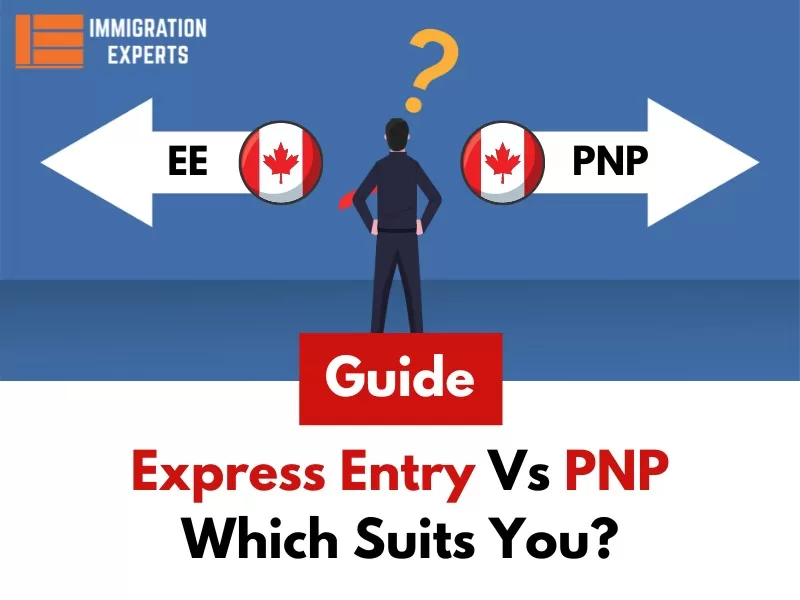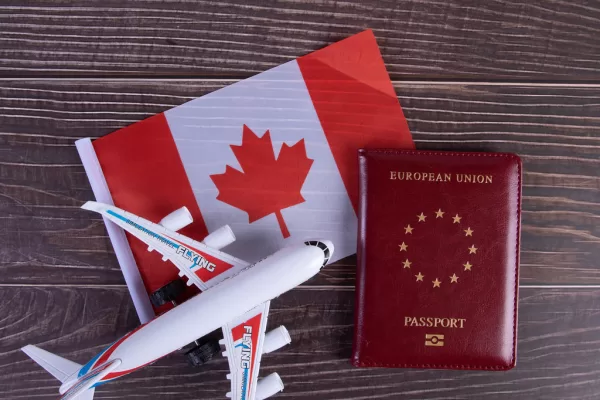051 8439995, 042 35911332

The immigration system in Canada is mainly handled through two channels: the Express Entry system and Canada’s Provincial Nominee Programs (PNPs). These are the major ways people become permanent residents in Canada each year.
In 2024, about 220,770 newcomers out of the 485,000 new immigrants will come through these routes.
If you’re considering moving to Canada, you might wonder whether to apply through Express Entry or a Provincial Nominee Program (PNP). Each option has its benefits. Keep reading to find out how to choose, the contrast between Base and enhanced PNPs, and additional helpful information.
What is Express Entry?
Express Entry is a system used by Canada to handle applications from economic immigrants. It’s a major way for people to move to Canada.

Within Express Entry, there are three immigration programs:
- Federal Skilled Worker Program (FSWP)
- Federal Skilled Trades Program (FSTP)
- Canadian Experience Class (CEC)
In 2024, Express Entry is expected to be the main route for newcomers to Canada. The country aims to welcome around 110,700 permanent residents through these programs.
Each of these programs has its own set of requirements that individuals must meet before they can apply to join the pool of eligible candidates in Express Entry. Once someone meets these requirements and submits their profile under one of the Express Entry programs, they become an official Express Entry candidate with a profile in the pool.
CRS Scores in the Express Entry Program
After submitting a profile to the Express Entry pool, all candidates receive scores through the Comprehensive Ranking System (CRS). These scores are based on factors like their skills, work experience, and other personal details.
Process of Obtaining Permanent Residence through the Express Entry System
Candidates then have to wait for an Express Entry draw, which can be specific to a program or general. They need to have a CRS score that matches or exceeds the minimum CRS score set in the draw to receive an Invitation to Apply (ITA) for permanent residence (PR). An Express Entry profile is valid for one year after submission, and candidates can resubmit their profile if it expires.
Once candidates receive an Invitation to Apply (ITA), they transition into being applicants. They need to submit a permanent residence (PR) application to Immigration, Refugees, and Citizenship Canada (IRCC) within 60 days of receiving the invitation. If their application is approved, they are granted permanent residence status and can settle in Canada.
Provinces in Canada also have the authority to invite candidates from the Federal Express Entry pool of eligible candidates. This is done through special Provincial Nominee Program (PNP) streams called enhanced streams. These streams are aligned with Express Entry but differ from standalone, or Base PNP streams.

To be nominated under an enhanced stream, individuals must receive an invitation from the Federal Express Entry pool or the provincial/territorial pool of eligible candidates. They then submit an enhanced PNP application to the province or territory. Candidates who receive a provincial nomination gain an extra 600 CRS points, which significantly improves their chances of receiving an Invitation to Apply (ITA) from the Federal Government. For more information on enhanced PNP streams.
Understanding Base Provincial Nominee Program (PNPs)
Base Provincial Nominee Programs (Base PNPs) are streams managed by provincial or territorial governments, separate from the Express Entry system. Each of these programs comes with its own set of eligibility criteria.
Initially, Base PNPs were established to assist provinces and territories in addressing local demographic and labor market challenges. They enable provincial and territorial governments to nominate eligible newcomers to settle and reside within their jurisdiction.
Each province and territory in Canada (excluding Quebec, which has its immigration programs, and Nunavut) operates its own PNP. Eligibility criteria can vary depending on the specific program one applies to. Generally, it may involve having lived, studied, or worked in the province, working in a high-demand profession, securing employment within the province, and possessing human capital attributes that the province considers advantageous to its local economy.
PNPs represent the second largest pathway for newcomers to Canada in the current year. Their objective is to distribute the advantages of immigration throughout the nation evenly. While not as significant as Express Entry in terms of newcomer intake for 2024, PNPs are projected to surpass all other immigration pathways by 2025 and 2026, becoming Canada’s primary means of welcoming newcomers to the country.
Conclusion
In Conclusion, if you’re highly skilled and meet the criteria for Express Entry programs, it may be the quicker route to permanent residency. However, if you have ties to a specific province or territory or meet the criteria for a PNP, it could offer a more tailored pathway to Canadian residency.
